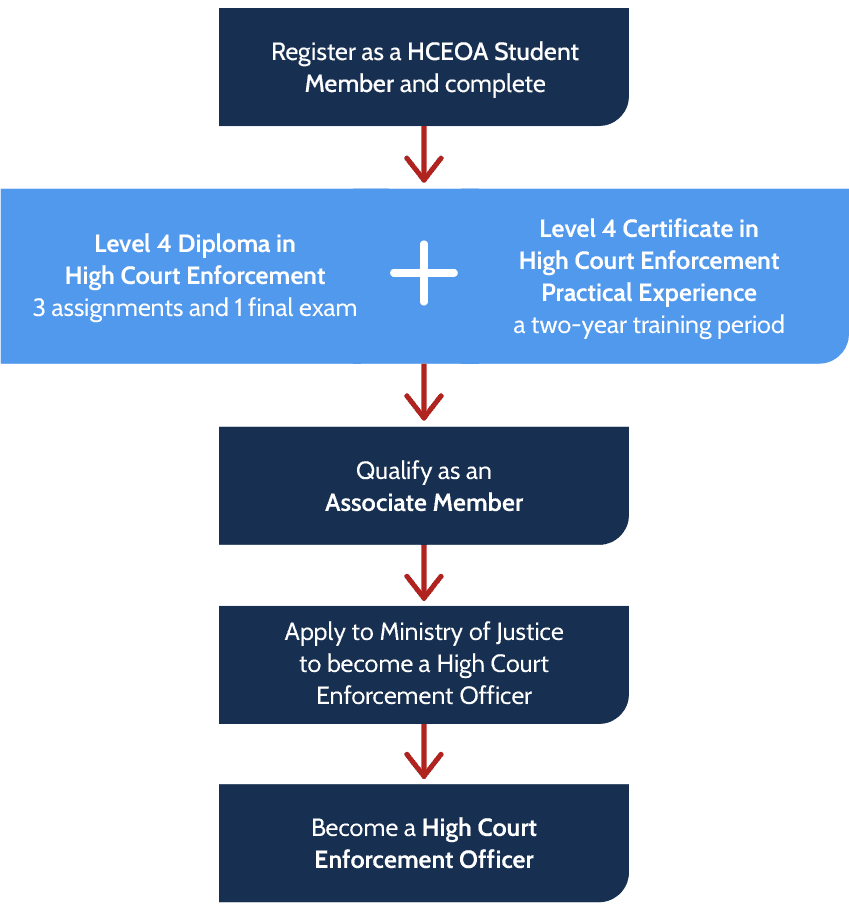The High Court Enforcement Officers Association (HCEOA) is the professional association representing High Court Enforcement Officers (HCEOs). It is also the officially designated membership body for High Court Enforcement Officers at all stages of their career, from student members to fully qualified HCEOs.
All members at all levels must agree to abide by the HCEOA’s Regulations and Code of Best Practice.
High Court enforcement is a rewarding, dynamic and long-term career, which could be right for you.
The diagram below shows how our members progress from when they join the association as students.

Applying for student membership:
All HCEOs start their career as student members.
Before you start your career in High Court enforcement you will need a relevant Level 3 qualification (e.g., the CICM’s level 3 Award in Advanced Enforcement, or an equivalent in in law, credit management or advanced enforcement) so you are eligible to become a student member.
Once you’re ready to apply for student membership, please email your CV and relevant qualification certificates to
If you are eligible, you will be sent an application form for completion and return with the joining fee (currently £50) and you will then receive a membership number and details of how to access the members’ area of our website which contains lots of useful resources, legislation, and guidance.
Student membership is then an additional £50 per year.
Student members:
Our student members are not undergraduates. They are usually professionals employed in the wider legal or enforcement sector and have identified they want to develop their future career in High Court enforcement.
Students will need to hold a County Court Certificate as an Enforcement Agent, having passed the Level 2 Taking Control of Goods exam, to enable them to carry out the enforcement work involved in the Practical Experience certificate detailed below.
Our members typically spend two-three years (but can spend up to a maximum of five years) as a student member whilst they complete two bespoke regulated qualifications in High Court enforcement:
- CICM Level 4 Diploma in High Court Enforcement, and
- CICM Level 4 Certificate in High Court Enforcement Practical Experience
The CICM Level 4 Diploma in High Court Enforcement (2022 syllabus) comprises of four compulsory units and assessments which you would study over two years:
- Writs of Control – assignment
- Writs of Execution – assignment
- HCEO Fees and Accounting – assignment
- High Court Enforcement (Laws and Regulations) – exam
The CICM Level 4 Certificate in High Court Enforcement Practical Experience is an independently assessed Certificate which aims to evidence that student members have met the minimum qualification requirements for enforcement work and in particular, their ability to carry out High Court Enforcement work.
It is a web-based exercise, requiring students to upload documents showing personal involvement in the various areas of enforcement covered by the Diploma course.
Once you have successfully completed both qualifications you become an Associate member of the HCEOA – which makes you a recognised professional and an expert in your field who can support a High Court Enforcement Officer in enforcing a writ.
Both the Diploma and the Certificate are run, certified and assessed by our education partner, Chartered Institute of Credit Management (CICM), and you can read more about the qualifications on the CICM website.
Student membership is £50 per year.
Associate Members:
Our Associate members are professionally qualified enforcement agents who can support HCEOs in enforcing writs. They will have spent two or more years as student members completing the relevant qualifications.
They are similar to a legal executive working for a firm of solicitors in that they are recognised professionals but don’t have the full title of HCEO.
They are different to our full members – who are all qualified and appointed HCEOs– in that they don’t have the same levels of responsibilities and can’t accept a writ from the High Court in their name.
Associate members need to complete the HCEOA’s Continuous Professional Development (CPD) programme on an annual basis and submit this to the Ministry of Justice for approval as and when requested.
They don’t have voting rights within the Association but are eligible to stand for election to the HCEOA Board.
Once you become an Associate member you are ready to take the final step to apply to become a HCEO. Some people choose to do this immediately, whereas others may spend years working as associate members without having the full responsibilities of a HCEO.
Associate membership is £60 per year.
Becoming a High Court Enforcement Officer:
HCEOA Associate Members are then the only people who can take the final step to become a HCEO by making a detailed submission to the Ministry of Justice for authorisation.
This submission is a detailed and thorough representation of how you intend to operate as a HCEO.
The High Court Enforcement Officers Regulations 2004 describe the minimum personal conditions to be met (Part 2 Section 4) and set out the application procedure (Part 2 Section 5).
Once you are ready to apply for authorisation, your submission should be sent to The Civil Procedure and Enforcement Policy Team at the Ministry of Justice.
Once this submission has been authorised by the Ministry of Justice you must inform the HCEOA by emailing
High Court Enforcement Officers:
High Court Enforcement Officers (HCEOs) are experts in their field. They are the only enforcement officers in England and Wales who can receive a writ for enforcement from the High Court in their name and who are authorised to enforce it.
When they accept a writ, HCEOs also accept responsibility for all aspects of the enforcement of that writ. These responsibilities include being responsible for the actions taken under the writ by you or your colleagues in your name, as well as the maintenance of case files and accountancy systems, and the paying over of money collected in your name.
They are also known as ‘full members of the Association’ and need to complete the HCEOA’s Continuous Professional Development (CPD) programme on an annual basis and submit this to the Ministry of Justice for approval as and when requested.
They have full voting rights on Association matters and are eligible to stand for election to the HCEOA Board.
Full membership is £75 a year.
A levy is charged on all High Court writs so full members also pay this levy, which varies in line with the volume of writs they receive each year.
Ancillary Members:
Ancillary membership is an alternative to student membership for people who work in the profession e.g., as enforcement agents, but have no intention of becoming a HCEO.
Ancillary membership is £25 and lasts for two years.
Membership features at a glance:
| Membership features | Membership level | |||
|---|---|---|---|---|
| Student | Associate | High Court Enforcement Officer (full member) | Ancillary | |
| Access to members’ area of HCEOA website | ||||
| Receives monthly newsletters and regular updates from HCEOA Chair | ||||
| Can join working groups set up by HCEOA | ||||
| Can attend HCEOA AGM | ||||
| Can vote in elections for HCEOA Board | ||||
| Can stand for election to HCEOA Board | ||||
| CPD required annually | ||||
| Can receive a Writ in their name from the High Court | ||||
| Listed in ‘Find a member’ pages on HCEOA website | ||||
| Annual cost of membership | £50 | £60 | £75 | £25 (for 2 years) |
For more information on different types of membership, please contact us.





